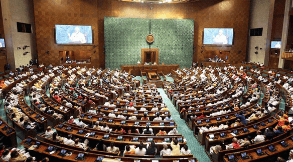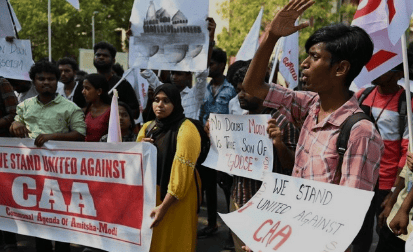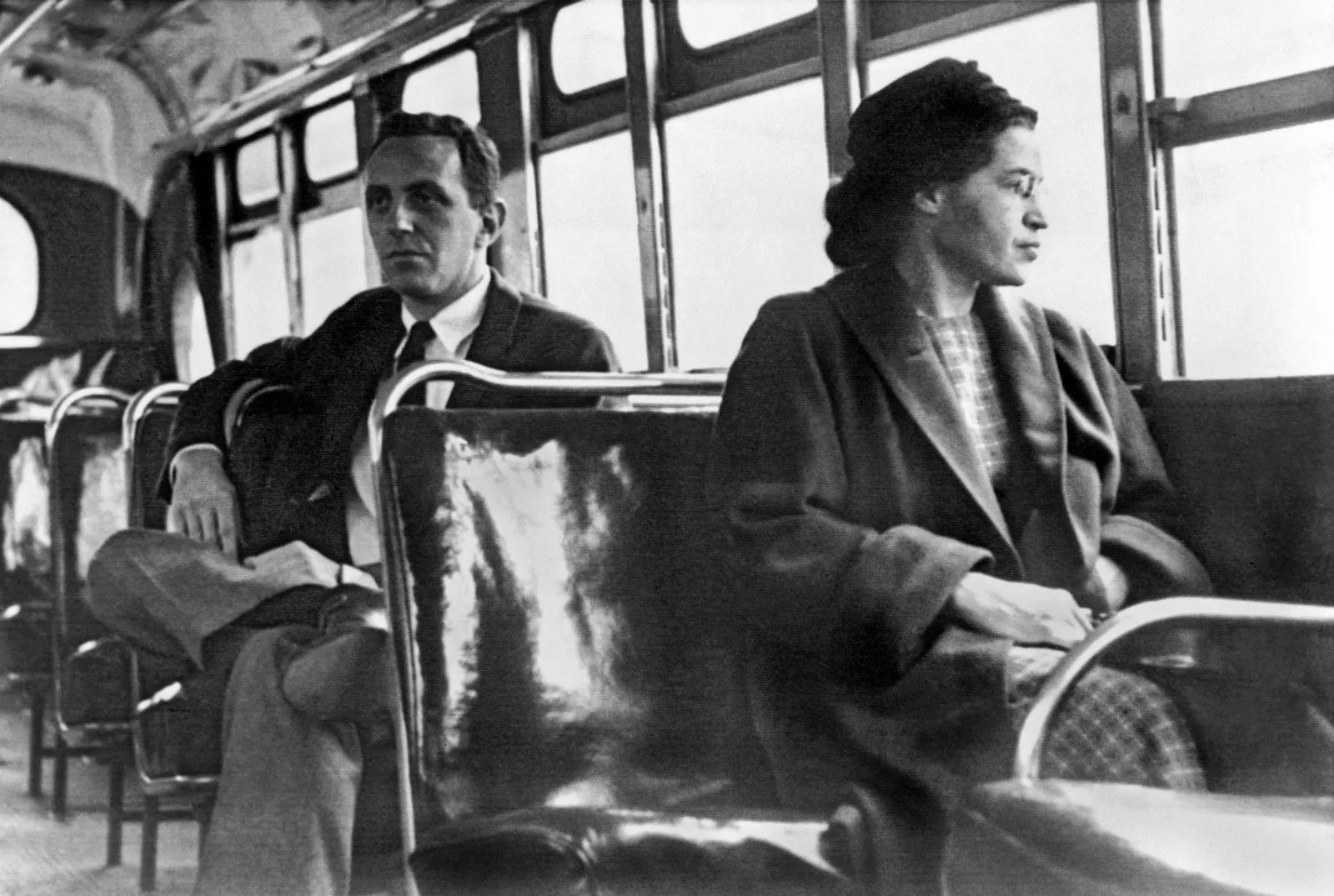Class 8 Civics Chapter 3 Notes - Why Do We Need a Parliament?
Parliament and the Making of Laws
We will explore the connection between participation in decision-making and the necessity for all democratic governments to have the approval of their citizens. These aspects collectively define democracy, with the Parliament embodying this concept.
The Parliament in India allows citizens to engage in decision-making and oversee the government, making it a vital symbol of Indian democracy and a fundamental aspect of the Constitution.

Why Should People Decide?
Prior to gaining independence from British colonial rule on August 15, 1947, the Indian public was not allowed to make their own decisions. The British government controlled everything and people were afraid to criticize any government decisions.

- India became independent on 15 August 1947 after a long and difficult freedom struggle.
- People from different sections of society joined the movement, motivated by the ideas of freedom, equality, and participation in decision-making.
- During British rule, people lived in fear and could not criticize the government’s decisions openly.
- Criticizing British decisions was risky and could lead to severe punishment.
- The freedom movement changed this, as nationalists began openly criticizing the British government and demanding rights.
- As early as 1885, the Indian National Congress (INC) demanded elected members in the legislature, with the right to discuss the budget and ask questions.
- The Government of India Act, 1909 allowed for some elected representatives in the legislature.
- However, this Act did not grant voting rights to all adults or allow people full participation in decision-making.
- The experience of colonial rule and the active participation of people in the freedom struggle convinced nationalists that everyone in independent India should have a role in making decisions.
- After gaining independence, the citizens of India were no longer subjects of a colonial power but free citizens of a democratic country.
- Independence did not mean that the government could act on its own; instead, it had to be responsible and sensitive to the needs and demands of the people.
- The aspirations of the freedom struggle were fulfilled in the Constitution of independent India, which introduced the principle of universal adult franchise, giving all adult citizens the right to vote.
People and Their Representatives
The central concept behind democratization is to ensure the consent, endorsement, and active participation of the general population.
- In such a democratic system, individuals or groups occupy a crucial position and contribute to the proper functioning of the democratic state.
- The government's primary objective is to gain the confidence of the citizens of the nation.
- During elections, people select their representatives and grant approval to the government. One group of elected representatives subsequently forms the government.
- The parliament, comprising all representatives, exercises authority over and provides direction to the government.
- Thus, the people, through their elected representatives, not only establish the government but also regulate its activities.
 Indian Parliament
Indian Parliament
What is the Role of the Parliament?
The Indian Parliament, which came into existence after 1947, wields significant authority in our political framework.
- The parliamentary system allows people to participate in decision-making through consent, with Parliament representing the populace.
- Elections for the Lok Sabha, held every five years, are similar to state legislature elections.
- The country is divided into constituencies, each electing one representative.
- Candidates from various political parties contest these elections.
- Once elected, they become Members of Parliament (MPs).
- The Parliament is responsible for governance and decision-making following the elections.

1. To Select National Government
Parliament is formed after selected candidates become Members of Parliament (MPs) representing a political party. To form a government, a party must secure a majority in the Lok Sabha, which consists of 543 elected members, requiring at least 272 seats.

- Opposition Party: The opposition party is formed by all political parties, not part of the majority party or coalition.
- Selection of the Executive: The Lok Sabha selects the executive, which is responsible for implementing laws made by the Parliament. The Prime Minister, the leader of the ruling party in the Lok Sabha, selects ministers to work with her in implementing decisions.
- Coalition Government: When no single party secures a majority, different political parties with similar concerns form a coalition government.
- Rajya Sabha: It represents the states in Parliament and can initiate legislation. For a bill to become law, it must pass through the Rajya Sabha. Members are elected by the Legislative Assemblies of various states, with 233 elected members and 12 nominated by the President.
2. To Control, Guide and Inform the Government
- The Parliament, during its sessions, commences with a period for asking questions.
- The question hour is a vital way for an MP to obtain details on how the government operates.
- Opposition parties have a crucial role in ensuring democracy functions well.
- They point out flaws in government policies, gather public support for their own, and keep the government alert with their inquiries.
- Making laws is a significant task carried out by the parliament.
 Session of Parliament
Session of Parliament
How Do New Laws Come About?
- The Parliament plays a crucial role in creating new laws.
- Various groups in society often raise the need for specific laws, highlighting different issues.
- Sensitivity to people's problems is an important responsibility of Parliament.

- An example of how domestic violence became a law demonstrates the process and the involvement of Parliament.
- Citizens play a crucial role in bringing their concerns to Parliament and shaping them into laws.
- Throughout the process, the voice of the citizen is essential, and it can be expressed through TV reports, newspaper editorials, radio broadcasts, and local meetings.
- These mediums contribute to making Parliament's work more accessible and transparent to the people.
Domestic violence
It refers to the violence and abuse which happens in a domestic setting like cohabitation or marriage. It is important to remember that domestic violence is not just physical but any kind of behaviour that tries to gain power and control over the victim.
The two rights the new law helped achieve for women who are survivors of violence:
(i) The new law recognises women's right to live in a shared household. Women can get a protection order against any further violence.
(ii) Women can get monetary relief to cover their medical expenses.
Unpopular and Controversial Laws
Sometimes, the Parliament passes laws that are legal and constitutionally valid, but they can still be very unpopular among the people. This happens when the public feels that the intention behind the law is unfair or harmful. In such cases, citizens have the right to express their disagreement with these laws. They can do this by:
- Criticizing the law publicly
- Holding public meetings
- Writing articles in newspapers
- Reporting issues to TV news channels
- In a democratic society like ours, citizens need to voice their concerns about laws they believe are repressive. When a significant number of people feel that a law is wrong, it puts pressure on the Parliament to reconsider and possibly change the law.
 People Protesting against Controversial Law
People Protesting against Controversial Law
Example: Municipal Laws on Hawking and Street Vending
Consider the municipal laws that regulate the use of public space within city limits. These laws often make hawking and street vending illegal. While most people agree that some rules are necessary to keep public spaces clear for walking, it is also true that hawkers and vendors provide essential services at affordable prices for millions of city dwellers. For many of these vendors, street vending is their only means of livelihood.
This creates a conflict because the law may favor one group over another. When laws are perceived as unfair, they can lead to public outcry and demand for change. In such situations, individuals who believe that a law is unjust have the option to approach the court. The judiciary has the authority to modify or annul laws if they are found to be in violation of the Constitution.
Rosa Parks
- Rosa Parks, an African-American woman, on December 1, 1955, declined to relinquish her seat to a white man on a bus.
- Her act of protest was against segregation laws that enforced racial division in all public areas, including streets.
- This refusal became a pivotal moment in the commencement of the Civil Rights Movement.
- The Civil Rights Movement ultimately resulted in the enactment of the Civil Rights Act of 1964, which made it illegal to discriminate based on race, religion, or national origin in the United States.
- Her act sparked a movement for Black people's rights and equality.
- This event, inspired by Mahatma Gandhi's teachings, had a significant impact on American attitudes.
 Rosa Parks
Rosa Parks
Key Words
- Approval: A formal agreement or acceptance of something, often given by a person in authority. It signifies that a proposal, decision, or document meets certain standards or criteria and can move forward.
- Coalition: A coalition is an alliance of parties or groups formed to achieve a common goal.
- Criticise: To criticize is to express disapproval or point out flaws in something.
- Evolution: The process of change in species over time through genetic variation and natural selection.
- Sedition: It is the act of inciting rebellion or violence against a government or authority, often through speech or writing. It involves encouraging resistance to lawful authority.
- Repressive: Refers to actions or policies that restrain, suppress, or limit individual freedoms, often enforced by an authority or government to maintain control.
- Unresolved: A situation, issue, or problem that has not been settled, concluded, or addressed, often leaving it open for future consideration or conflict.
Frequently Asked Questions (FAQs)
Q1: What is the Parliament?
The Parliament is the supreme legislative body of India. It is made up of two houses - the Lok Sabha (House of the People) and the Rajya Sabha (Council of States).
Q2: Why do we need a Parliament?
The Parliament is important because it is the institution that makes laws for the country. It is also responsible for holding the government accountable and ensuring that it works in the best interest of the citizens.
Q3: What are the functions of the Parliament?
Some of the major functions of the Parliament are: legislative functions, financial control, providing and exercising control over Cabinet, critical assessment of the work of the Cabinet, role of opposition, an organ of information, constitutional functions, judicial functions, and elective functions.
Q4: What is the difference between Lok Sabha and Rajya Sabha?
Lok Sabha is the lower house of the Parliament and represents the people of India. Members of the Lok Sabha are directly elected by the people. Rajya Sabha is the upper house of the Parliament and represents the states and union territories of India. Members of the Rajya Sabha are elected by the members of the state legislative assemblies.
Q5: How are the members of the Lok Sabha elected?
The members of the Lok Sabha are directly elected by the people of India through a process called general elections. The elections are held every five years, unless dissolved earlier, and are conducted by the Election Commission of India. The country is divided into numerous constituencies and each constituency elects one member to the Lok Sabha.
|
70 videos|560 docs|46 tests
|
FAQs on Class 8 Civics Chapter 3 Notes - Why Do We Need a Parliament?
| 1. What is the main function of Parliament in the law-making process? |  |
| 2. How do citizens influence the laws that Parliament makes? |  |
| 3. What happens if a law proposed by Parliament is unpopular? |  |
| 4. What steps are involved in the process of making a new law? |  |
| 5. Why is it important for people to have representatives in Parliament? |  |

















